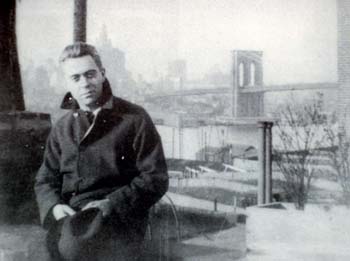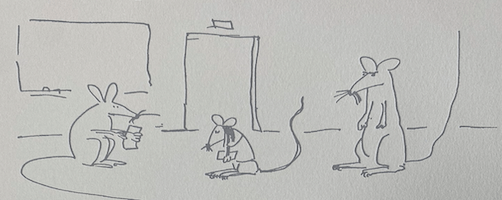At eleven I learned to lie.
Disobedience and its partner,
deception, became my constant companions.
How enormous then that first transgression,
against Father’s command, a sin damning as Adam’s:
walking to school alone.
We all lied, mother explained,
it was. . .necessario.
How else to survive
Father’s rages,
his sweeping interdicts
and condemning opinions?
Oh sweet allegiance of lies:
siblings and mother bound
together in a cozy tie!
My brothers’ lies
were manly,
obdurate, built to last.
Mother’s were infirm little things,
infected from birth by her obstinate grace,
fated to die as soon as they hit the air.
But this lie, the lie about me, was sturdy,
knit, as it was, from the fiber of maternal love
and a wife’s defiance.
Go ahead; it’s right.
Walk alone. Grow up.
Each assurance a coercion, each coercion a shame.
The lie was a coat of mail
I’d don each day, threading my arms
through its leaden sleeves,
pulling its weight over my head,
steeling myself
for my father’s wrath.
In it I was strong and getting stronger,
but tired, always tired.
Oh to rest, shuck the lie and confess!
Father forgive me, I knew not what I did!
At night I’d rehearse the lines
and pray for his cleansing fury.
In the morning I’d meet him in the hall,
already crabby in his gray lab coat,
barking his harsh observations
about my robe (pink: ridiculous)
about my face (vacant)
about my voice (inaudible).
Mother, how did we produce such an insect!
I was used to this.
Exasperated, he would stuff his red frizz into a beret,
hurl himself into his loden cape
and bolt out the gate–too rushed for truths.
Silenced again, I would resume my solitary mission,
lugging my books, wearing my lie to school
and back again, through the maze of city streets.
One day the mist briefly lifted and I saw
the winter sun pulsing silver and pale
through a hole in the sky–a quiet disk
hopeful as the moon.
A face emerged, white whiskers smiling,
familiar, professorial–an angel perhaps,
or a friend of the family–
here to guide me safely
across the river to school.
He took my bag and my arm,
allaying my fears with talk
calculated to soothe, flatter, amuse.
Gentile, cosí gentile.
Ever faithful, he met me at my gate
morning after sweet morning.
We chatted carelessly the whole way,
intimate as lovers,
never a snag
or worry to hold us up–
I, grateful and happy,
he gently leading the way.
My trust deepened daily with his purpose
and burrowed
in the snug darkness of short days
where the new lie took root.
From deep in the loam, the probing
stem pushed to the surface.
Meanwhile, the first lie grew light with practice.
And my coat assumed
the comfort of a uniform.
His purpose, obscured from the start by fear,
suppressed tenaciously
by innocence–canny innocence–
flared up in a question,
betraying an ignorance
both clear and obscene:
“Little Girl, would you touch me–here?”
Suddenly my hand, sweetly warming
in his flannel pocket, was pushed
to the hard, oozing center.
My hand recoiled.
But the ooze stuck.
In that minute my childhood ended.
I ran home as fast as my legs would carry me
to hide my shame in the place
where secrets were made and kept,
willful little liar, disobedient
sinner trying to find my way alone
through fog, through lies.
My life was filling up with secrets
and deceit’s secretions,
loneliness and melancholy.
I hugged my coat tight against my body
so that the lies and I were one.
 Hart Crane was one of my favorite poets when I was a teenager. I used to wander around reciting his musical poems aloud. His most famous poem is “To Brooklyn Bridge.” Now he seems almost unnoticed, so I thought I’d post one of his that I remember. I especially love the last four lines.
Hart Crane was one of my favorite poets when I was a teenager. I used to wander around reciting his musical poems aloud. His most famous poem is “To Brooklyn Bridge.” Now he seems almost unnoticed, so I thought I’d post one of his that I remember. I especially love the last four lines.
